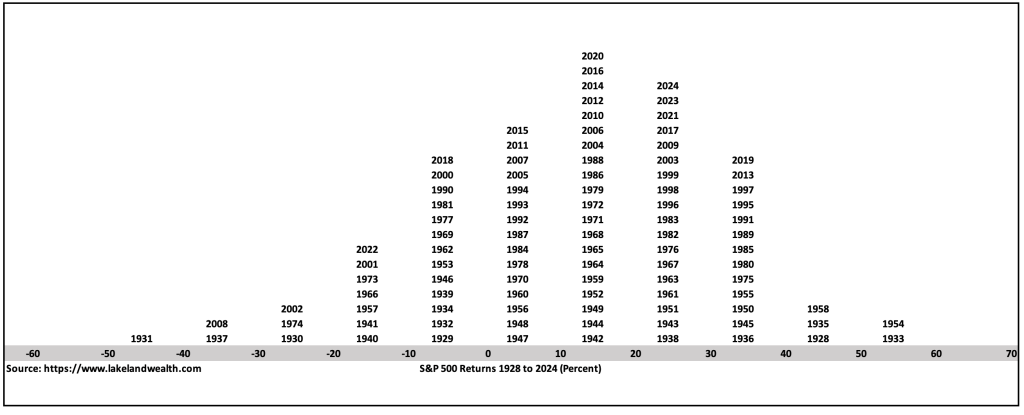By: Sreeni Meka, Principal Executive Officer of Lakeland Wealth Management LLC
It is not the timing of the market but the time in the market. Most financial advisors get a call or two from nervous investors when the markets are volatile. Most investors act like long-term investors and think about saving for their retirement and children’s educational expenses, and they keep a long-term perspective; once the markets get into volatility, the attitude and long-term vision scatter, and the fear of heights kicks in. In the investing world, most people damage themselves by self-inflicting wounds. Markets go up on the escalator and drop down by the elevator. We all invest in the companies as they grow inch by inch. As the revenues increase, so do the profits, and the valuation goes up yearly. Markets price the company valuation based on the earnings, market share, and future earnings potential.
When the bad news comes into the markets, the animal spirits kick in, and all run for safety. The stampede adds fuel to the fire, sell-offs continue, and prices drop to irrational levels. Those who have waited so many months to double the prices often sell at half the price when fear controls the markets. What if you invert the animal spirits? That is the time bargains come into the picture. This year, we have gone through nothing but market correction, not a bear market. Technically, anytime a market drops below 20 percent, it is called a correction, and above 20 percent is termed a bear market. Irrespective of how we define the market, we need extraordinary discipline to be a successful investor. It is not about intelligence but about emotional balance when investing. All your financial degrees in business or CFA charter get you a ten percent edge over the general public; however, ninety percent of your returns come from emotional balance.
Water flows from high ground to low ground. If there is an obstacle, it veers around and continues to flow downstream. Markets follow the cumulative mechanism. Earnings provide dividends, and retained earnings increase the book value of the firm. Over time, all successful firms increase their net value. When you invest in a successful firm, despite ups and downs, eventually, firm value grows as time passes.

Historically, market returns are positively skewed. I plotted the market returns from the pre-depression era to the last year, 2024. They ranged from negative 44 percent to 53 percent. If we ignore the outlier returns, the market returned between ten and twenty percent in most years with an average return of twelve percent, including dividends. More than seventy-two percent of the time, market returns are positive, and some years, market returns are negative. The recent tariff and trade negotiations spooked the stock market and scared the chicken hearts. Those who jumped off the seats got burned as markets recovered with a vengeance and trade negotiations picked up. The key to investing is persistence and patience. Those who stay the course both thick and thin and stick to the long-term goals will win.
PHOTO CREDIT: https://www.shutterstock.com/g/Zephyr_p
VIA SHUTTERSTOCK
DISCLOSURES:
Investing involves risk, including the possible loss of principal. Diversification does not ensure a profit nor guarantee against a loss.
Lakeland Wealth Management LLC is a registered investment adviser. Lakeland Wealth Management LLC provides data to Interactive Advisors pursuant to a licensing agreement. Lake Wealth Management LLC does not provide investment advice to Interactive Advisors or Interactive Advisors clients.
This material represents an assessment of the market environment at a specific point in time and is not intended to be a forecast of future events, or a guarantee of future results. This information is not intended to be individual or personalized investment or tax advice and should not be used for trading purposes. Please consult a financial advisor or tax professional for more information regarding your investment and/or tax situation.


